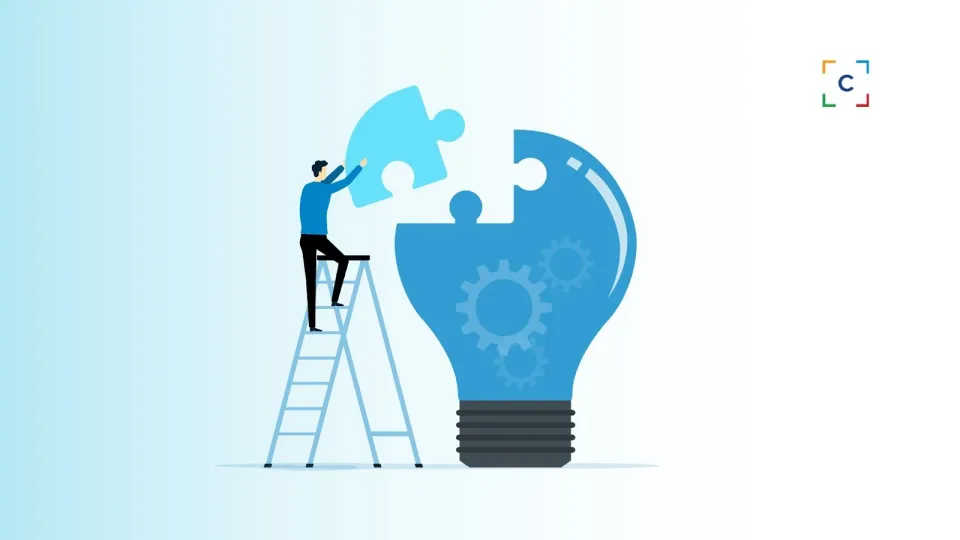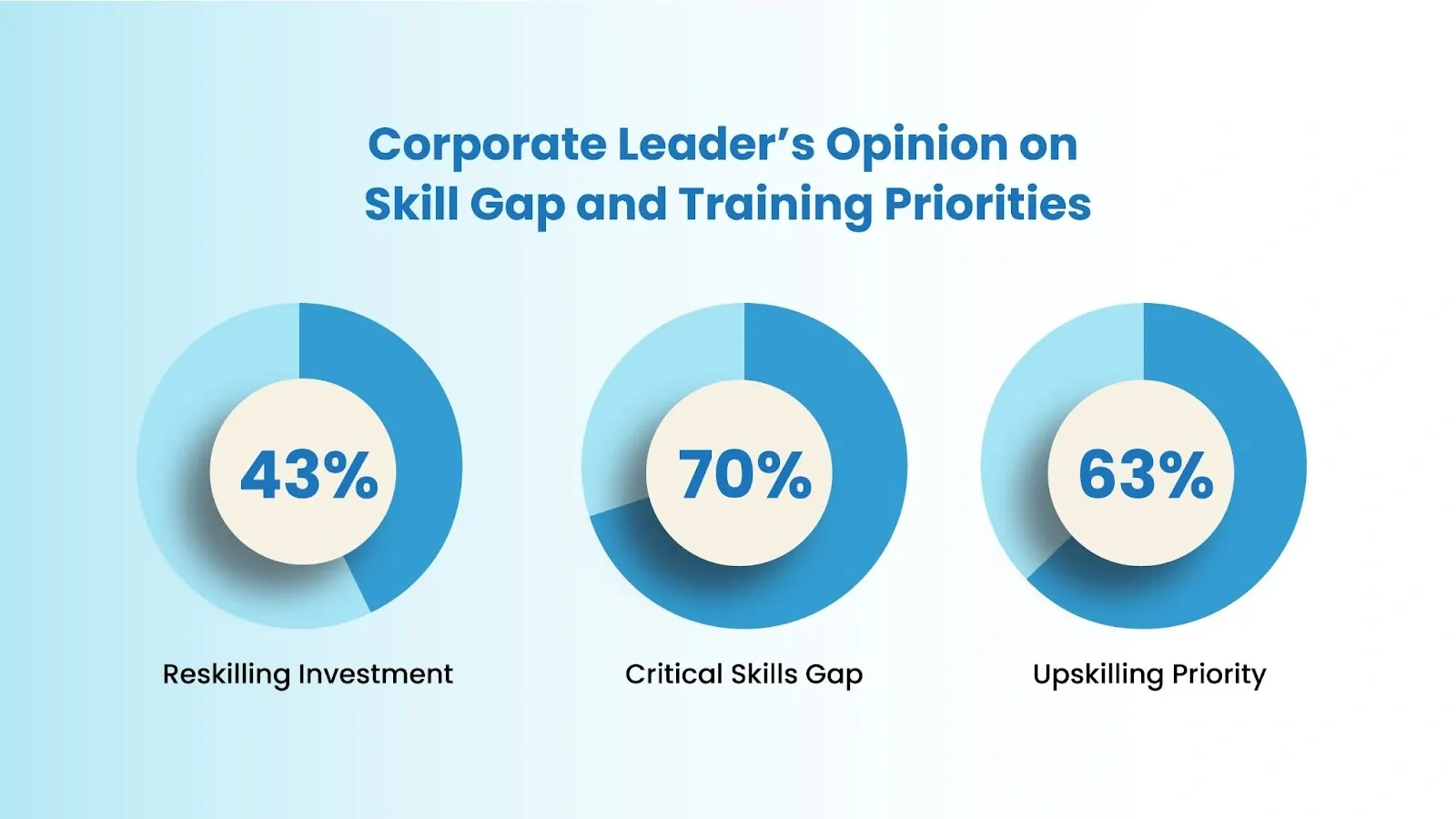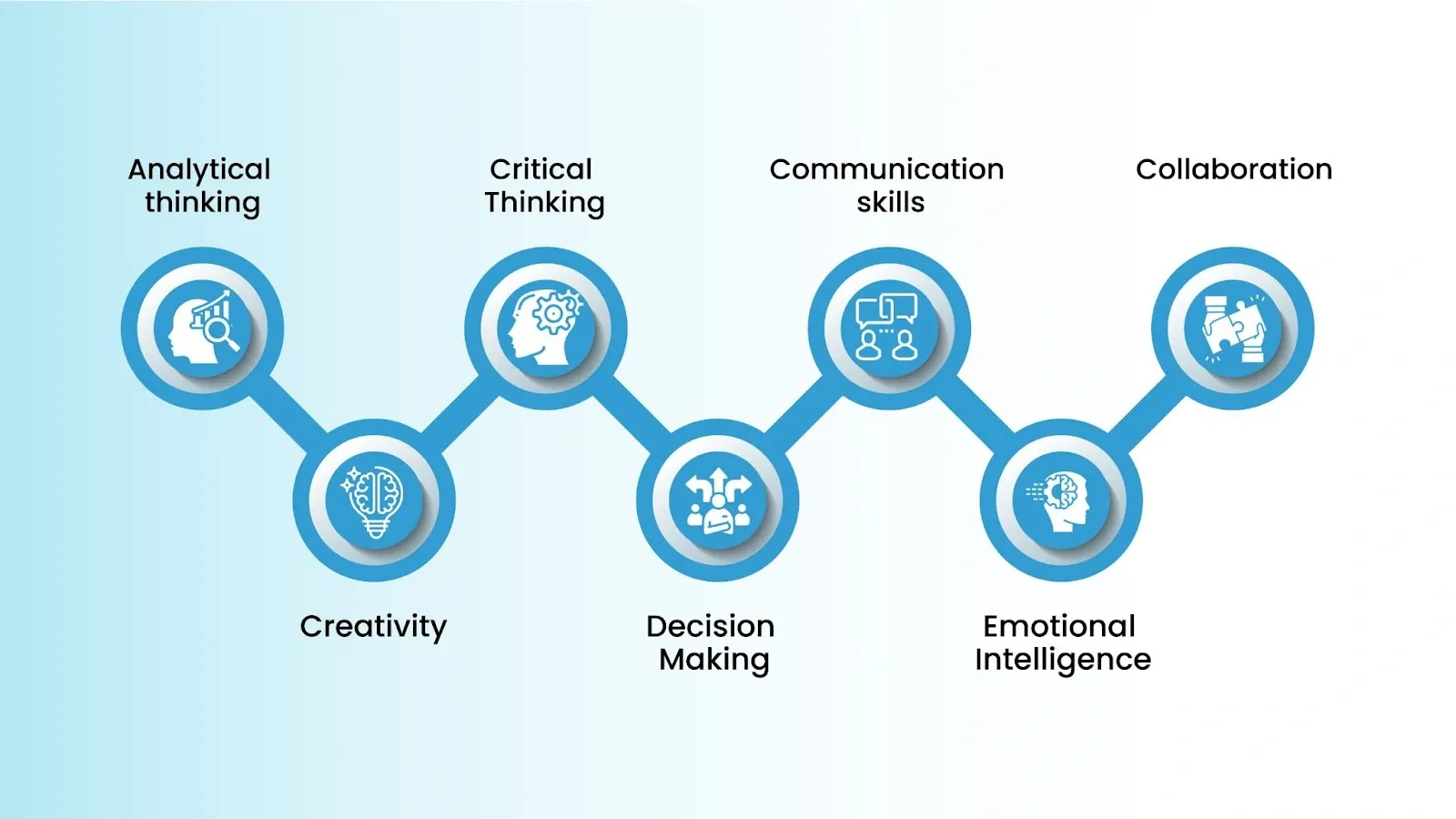Problem-Solving Skills Employers Seek for Success in 2024: Top 7 Skills

A workplace without problems is no less than any fantasy world!
While carrying out tasks and activities to accomplish company goals by everyone, there are chances of facing unexpected problems can arise. So, as an employee, your employer will expect specific problem-solving skills with all other requirements from you.

According to a survey, 70% of corporate leaders report a critical skills gap in their organization, which is negatively impacting business performance. Over 63% of leaders say that upskilling is the top priority for solving their company skills gap in the next year, and 43% plan to invest in reskilling to help employees acquire a new set of skills to transition to wholly new roles.
The number speaks to the importance of problem-solving skills at work. In this blog, we will discuss problem-solving skills and seven must-have problem-solving skills in the workplace.
What are problem-solving skills?
Problem-solving skills in the workplace are your superpowers! They will help you tackle different types of obstacles that come your way in your workplace. Problem-solving skills can be anything, from analytical thinking and creativity to critical thinking and conceptual skills.
Imagine this scenario: you are having an important presentation with one of your finest international investors, but all of a sudden, your system fails. Problem-solving skills are practically used in such situations. You should use your critical thinking skills to identify how the system failed and correct it, or if you don’t have any idea about the repair system, then you have to decide to call someone before the presentation and get it done. Or try to convince investors to reschedule the meeting for the proper reason so that they can understand your situation. Here, persistence plays an important role, not only in convincing investors but also in calming your panicked team who would wonder what to do in such situations.
In today’s competitive business environment, employers are also looking for people who can face such challenges and dynamic changes to run their operations smoothly without any type of loss.
Types of problem-solving skills
- Cognitive Skills - cognitive skills are the ability we use to think, learn, and remember. It involves processes like focusing attention, understanding data, decision-making, and solving problems. Basically, you use your mental abilities to do certain activities.
- Creative skills - these skills are about thinking outside the box and coming up with new and original ideas. With these skills, you can come up with unique solutions to problems or unique ways to solve them.
- Interpersonal skills: These are the ability to interact with others effectively. They usually include skills like communication and sympathy.
- Practical skills: These are not like cognitive skills, where you use your mental abilities; these skills are hands-on abilities. To develop such skills, you need to practice them. These skills include cooking, knitting, and using the tools.
7 must-have problem-solving skills

Analytical thinking
This Skill is used to solve problems by breaking down complex parts or tasks into smaller and more manageable ones. This will help you solve problems without any obstacles. Such problem-solving skills at work will help you understand programs and technology, identify sales patterns, understand performance, drive insights, etc. Analytical skills can be used in any field of interest, which makes them a skill employers look for.
Creativity
This Skill helps you develop innovative solutions to problems or ideas. Employers look for people who can come up with creative ideas to stand out in a competitive workplace. Also, by using these skills, you can capture your target audience’s attention and differentiate your brand from the crowd. Such skills can be used to come up with innovative advertising ideas or marketing campaigns, depending on the field.
Critical Thinking
This Skill refers to the thinking process of evaluating information and statements with the purpose of making reasonable judgments. Such problem-solving skills at work will help you to understand any kind of new update in various departments like technology, marketing, or finance. Based on your observation and understanding, you can make reliable results or impact that change, based on which you can share your opinions.
Decision making
Employers look for such skills without mentioning them. Decision-making is a skill that is believed to be a very common and essential skill you must have. For the employer, it is crucial to know whether you are capable enough to make intelligent decisions in challenging situations at your work.
For this, you need to understand the pros and cons of challenge and the decision you make. You should be ready to face the consequences of your decisions.
Communication skills
Similar to decision-making skills, communication skills are skills employers look for when assessing you for a job interview, performance analysis, or job promotion. While all other problem-solving skills at work are used to solve problems and make decisions, these communication skills are used to convey ideas and solutions effectively to the respective people at the workplace. To communicate information with relevancy and reliability, you need to be an active listener, too.
Emotional Intelligence
The ability to identify and understand your emotions and others is known as emotional intelligence. How you identify and respond to emotions is a skill that you should learn in the workplace.
Especially when it comes to dealing with customers, investors, managers, and anyone whom you want to sell or convince. Understanding people at an emotional level will help you to understand their actual requirements, and based on it, you can prepare strategies to tackle them. Such problem-solving skills at work will be your employer’s expectation.
Collaboration
Being collaborative is the ability to work effectively within teams and with others towards a common goal. At the workplace, every department are working separately. Still, ultimately, in the end, they are working towards a company goal only. So your employer will be looking for this Skill in you. This will make them believe that you are flexible enough to work individually and within the team.
Additional Important Problem-solving Skills examples
Apart from these 7 must-have skills, your employer will also look into these additional problem-solving skills.
- Adaptability: In a dynamic working environment, your employer will expect you to adapt smoothly and quickly.
- Time Management: The ability to manage your time and complete assigned tasks within the deadline.
- Conflict Resolution: This Skill involves the process of resolving a dispute or disagreement by addressing each party's needs and finding mutually acceptable solutions.
- Negotiation skills: This is the ability to discuss and reach a mutually acceptable agreement between two or more parties with different needs and viewpoints.
- Leadership: It is the ability to take the lead at work, make the right decisions, and encourage the team to complete their work.
Introducing getCREDIBLE: Professional Credibility Builder
Get noticed by top employers and collaborators with getCREDIBLE, the ultimate platform for creating a dynamic digital resume. Go beyond the traditional static format and showcase your skills, experience, and achievements engagingly. Not only a digital resume builder but getCREDIBLE’s ket features increase your professional credibility too.
Key Features of getCREDIBLE:
- Craft a Dynamic Digital Resume: Effortlessly build a comprehensive profile that highlights your education, work history, and significant project milestones.
- Leverage Social Proof: Collect valuable feedback from colleagues directly on your profile. This "social proof" enhances your credibility and attracts potential employers.
- Enhance Your Visibility: getCREDIBLE ensures you stand out with a professional and dynamic online presence.
How getCREDIBLE can help in highlighting your problem-solving skills
With building a digital resume and professional credibility, you can use getCREDIBLE’s features to highlight and improve your skills, too. Let’s see how:
- Feedback Feature: In getCREDIBLE, you can get feedback from people whom you have added to your projects on your performance and achievements. This feedback will highlight the skills you utilized to accomplish your goals, providing a comprehensive view of your capabilities and contributions.
- Milestone feature: You can also add your accomplishments as milestones in your digital portfolio, which will again highlight the problem-solving skills you mentioned in your milestone.
Like this, we can use getCREDIBLE in many different ways to develop your professional life.
Conclusion
Problem-solving skills are essential for achieving success and efficiency in the workplace. A well-developed ability to solve problems can significantly enhance your chances of impressing employers and advancing in your career.
With the help of getCREDIBLE features, you can strategically highlight your problem-solving skills. It will aid in demonstrating your ability to overcome challenges and excel in various professional scenarios.
Register today at getCREDIBLE for free and experience the benefits yourself.
Frequently Asked Questions
- What is a good example of problem-solving Skill?
- For example, you find your project is lagging, and your manager asked to speed it up. Here, you will use your problem-solving skills. You will understand the reason behind lagging, and then you will come up with strategies to improve it.
- How do you improve problem-solving skills?
- Try to solve practical problems or try to solve scenarios happening around you in the workplace. Use critical thinking, get suggestions, and learn from others how to deal with particular problems.
- What is problem-solving in daily life?
- Problem-solving in daily life involves addressing everyday issues, such as fixing a broken appliance, resolving conflicts, or effectively managing time to meet personal and professional commitments.
